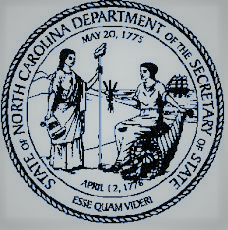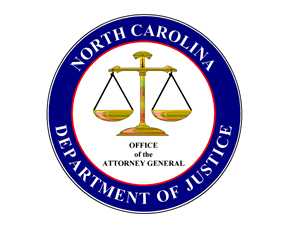
The North Carolina Council of State is the collective name for the senior executive offices in the Government of North Carolina, all of which are established by the Constitution of North Carolina. Currently, the Council of State includes the popularly elected Governor, Lieutenant Governor, Secretary of State, Auditor, Treasurer, Superintendent of Public Instruction, Attorney General, Commissioner of Agriculture, Commissioner of Labor and Commissioner of Insurance. In its current form, the Council of State meets periodically, with the Governor as chair, to allow for coordination and exchange of information across executive branch agencies and to vote on certain decisions, especially regarding the sale of government property or the borrowing of money.

The North Carolina Secretary of State is an elected constitutional officer in the executive branch of the government of the U.S. state of North Carolina, and is fourth in the line of succession to the office of Governor of North Carolina. The secretary is maintains the official journal of the North Carolina General Assembly and is responsible for overseeing land records, chartering corporations, and administering some commercial regulations. The incumbent is Elaine Marshall, a Democrat and the first woman elected to the office.

The North Carolina State Treasurer is a statewide elected office in the U.S. state of North Carolina responsible for overseeing the financial operations of state government. The current state treasurer is Dale Folwell.
A comptroller is a management-level position responsible for supervising the quality of accounting and financial reporting of an organization. A financial comptroller is a senior-level executive who acts as the head of accounting, and oversees the preparation of financial reports, such as balance sheets and income statements.
The North Carolina Superintendent of Public Instruction is the elected head of the North Carolina Department of Public Instruction and oversees the public school systems of the state.
The Comptroller and Auditor General of India is the Constitutional Authority in India, established under Article 148 of the Constitution of India. They are empowered to Audit all receipts and expenditure of the Government of India and the State Governments, including those of autonomous bodies and corporations substantially financed by the Government. The CAG is also the statutory auditor of Government-owned corporations and conducts supplementary audit of government companies in which the Government has an equity share of at least 51 per cent or subsidiary companies of existing government companies. The reports of the CAG are laid before the Parliament/Legislatures and are being taken up for discussion by the Public Accounts Committees (PACs) and Committees on Public Undertakings (COPUs), which are special committees in the Parliament of India and the state legislatures. The CAG is also the head of the Indian Audit and Accounts Department, the affairs of which are managed by officers of Indian Audit and Accounts Service, and has 43,576 employees across the country.

The Attorney General of North Carolina is the elected head of the state's Department of Justice. The North Carolina Constitution provides for the election of the attorney general to serve a four-year term. There is no limit on the number of terms a person may serve in the office.

The state auditor of Minnesota is a constitutional officer in the executive branch of the U.S. state of Minnesota. Nineteen individuals have held the office of state auditor since statehood. The incumbent is Julie Blaha, a DFLer.

The New York State Comptroller is an elected constitutional officer of the U.S. state of New York and head of the New York state government's Department of Audit and Control. The New York State Comptroller is the highest-paid state auditor or treasurer in the country. Sixty-one individuals have held the office of State Comptroller since statehood. The incumbent is Thomas DiNapoli, a Democrat.

The Commissioner of Labor of North Carolina is the head of the state's Department of Labor.

The Oklahoma State Auditor and Inspector is an elected Constitutional officer for the U.S. State of Oklahoma. The State Auditor and Inspector is responsible for auditing and prescribing bookkeeping standards of all government agencies and county treasurers within Oklahoma. The office in its current form is a consolidation of the office of State Auditor with that of the office of State Examiner and Inspector, both of which dated back to statehood in 1907. The two positions were combined in 1979 after passage of State Question 510 in 1975. Tom Daxon was the first person to hold the combined office and the first Republican as all previous occupants of either position were Democrats.
The New Jersey State Auditor is a constitutional officer appointed by the New Jersey Legislature and administratively placed within the Office of Legislative Services. The Auditor conducts financial and performance audits of State agencies, certain school districts, and vicinages of the Judiciary. The State Auditor also conducts studies on the operation, economy and efficiency of State-run or State-supported programs.

State auditors and state comptrollers are fiscal officers lodged in the executive or legislative branches of U.S. state governments who serve as external auditors, inspectors general, or financial controllers of public funds. The office of state auditor or comptroller may be a creature of the state constitution or one created by statutory law.
The Office of the Auditor General Manitoba—known as the Audit Office (1876–1916), Office of the Comptroller-General (1916–69), and Office of the Provincial Auditor (1969–2001)—is an independent office of the Legislative Assembly of Manitoba whose stated purpose is to assist Members of the Legislative Assembly with matters such as accountability and the performance of government.

The Comptroller of Illinois is a constitutional officer in the executive branch of government of the U.S. state of Illinois. Ten individuals have held the office of Comptroller since the enactment of the Illinois Constitution of 1970, replacing the prior office of Auditor of Public Accounts that was first created in 1799. The incumbent is Susana Mendoza, a Democrat.

The government of North Carolina is divided into three branches: executive, legislative, and judicial. These consist of the Council of State, the bicameral legislature, and the state court system. The Constitution of North Carolina delineates the structure and function of the state government.

The Office of the Comptroller and Auditor General of Bangladesh (C&AG) is the Supreme Audit Institution (SAI) of the country. Like the SAIs in many other countries across the world the institution is established by the Constitution of Bangladesh. This institute is responsible for maintaining accounts of the republic and audits all receipts and expenditure of the Government of Bangladesh, including those of bodies and authorities substantially financed by the government. The reports of the CAG are discussed by the Public Accounts Committee, which is a standing committee in the Parliament of Bangladesh.
The Auditor-General of New South Wales helps the Parliament of New South Wales hold government accountable for its use of public resources.
The Comptroller and Auditor General (C&AG) is the constitutional officer responsible for public audit in Ireland. The Office of the Comptroller and Auditor General is the public audit body for the Republic of Ireland and is headed by the C&AG.

The Ghana Audit Service is an independent government agency in Ghana that is responsible for carrying out the audits on the accounts of the Government, Regions as well as the activities of the Ministries, Departments, Agencies and Companies under the Government of Ghana. Both the Office of the Auditor-General of Ghana and the Ghana Audit Service were established by the 1992 Constitution of Ghana. Internationally, the equivalent of the Ghana Audit Service is referred to as the Supreme Audit Institution (SAI). The International Organization of Supreme Audit Institutions (INTOSAI) is the international board that oversees and creates benchmark for auditing public entities for all Supreme Audit Institutions including Ghana who are also members.


























